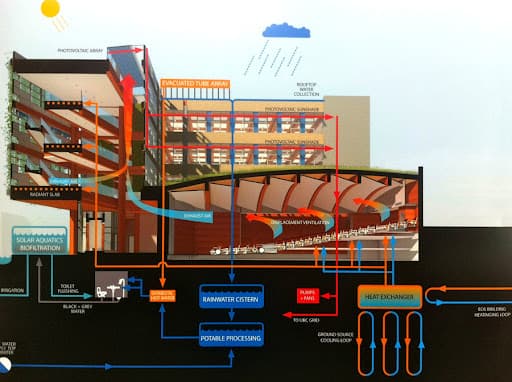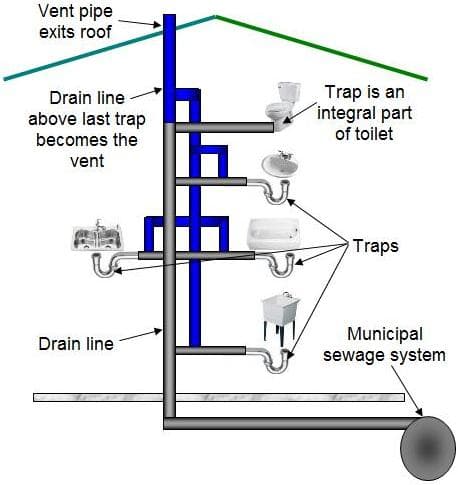Breaking Down The Layout of Your Property's Plumbing System
Breaking Down The Layout of Your Property's Plumbing System
Blog Article
They are making several good annotation on Exploring Your Homes Plumbing Anatomy in general in this great article beneath.

Recognizing just how your home's pipes system functions is important for each house owner. From supplying tidy water for alcohol consumption, cooking, and bathing to safely eliminating wastewater, a well-maintained pipes system is critical for your family members's wellness and convenience. In this extensive guide, we'll explore the intricate network that comprises your home's plumbing and offer suggestions on maintenance, upgrades, and managing typical problems.
Intro
Your home's pipes system is more than simply a network of pipelines; it's an intricate system that guarantees you have accessibility to tidy water and reliable wastewater elimination. Understanding its elements and how they interact can assist you avoid costly fixings and make sure whatever runs smoothly.
Fundamental Components of a Pipes System
Pipes and Tubing
At the heart of your pipes system are the pipes and tubing that lug water throughout your home. These can be made from numerous materials such as copper, PVC, or PEX, each with its advantages in regards to sturdiness and cost-effectiveness.
Components: Sinks, Toilets, Showers, etc.
Fixtures like sinks, commodes, showers, and tubs are where water is used in your home. Understanding just how these components link to the plumbing system helps in detecting issues and preparing upgrades.
Valves and Shut-off Factors
Shutoffs manage the flow of water in your pipes system. Shut-off shutoffs are important during emergency situations or when you require to make repair work, enabling you to separate parts of the system without interfering with water circulation to the entire house.
Water System
Key Water Line
The primary water line connects your home to the metropolitan supply of water or a private well. It's where water enters your home and is dispersed to different fixtures.
Water Meter and Stress Regulator
The water meter measures your water use, while a pressure regulator makes sure that water streams at a safe stress throughout your home's plumbing system, protecting against damage to pipes and components.
Cold Water vs. Hot Water Lines
Recognizing the distinction in between cold water lines, which supply water directly from the primary, and warm water lines, which bring warmed water from the water heater, aids in troubleshooting and preparing for upgrades.
Drainage System
Drain Pipes Pipeline and Traps
Drain pipes bring wastewater away from sinks, showers, and bathrooms to the sewer or septic system. Catches avoid sewage system gases from entering your home and likewise catch particles that could trigger obstructions.
Ventilation Pipelines
Ventilation pipelines allow air into the water drainage system, protecting against suction that can slow drain and trigger catches to vacant. Proper ventilation is important for preserving the honesty of your pipes system.
Importance of Proper Drain
Making sure correct water drainage prevents back-ups and water damages. Routinely cleaning drains and preserving catches can avoid expensive repair services and expand the life of your pipes system.
Water Heater
Sorts Of Hot Water Heater
Water heaters can be tankless or traditional tank-style. Tankless heaters warm water on demand, while tanks save warmed water for instant usage.
Updating Your Pipes System
Reasons for Upgrading
Upgrading to water-efficient components or replacing old pipes can improve water quality, decrease water expenses, and enhance the value of your home.
Modern Plumbing Technologies and Their Benefits
Discover modern technologies like wise leak detectors, water-saving toilets, and energy-efficient hot water heater that can conserve money and reduce ecological effect.
Expense Considerations and ROI
Determine the in advance expenses versus long-term financial savings when taking into consideration pipes upgrades. Several upgrades spend for themselves through decreased utility costs and less repair services.
Exactly How Water Heaters Connect to the Pipes System
Recognizing exactly how water heaters connect to both the cold water supply and hot water distribution lines helps in diagnosing issues like not enough warm water or leaks.
Maintenance Tips for Water Heaters
Regularly purging your water heater to get rid of sediment, checking the temperature setups, and checking for leaks can expand its life-span and enhance power effectiveness.
Typical Plumbing Problems
Leaks and Their Causes
Leakages can happen due to maturing pipes, loosened fittings, or high water stress. Attending to leaks immediately avoids water damages and mold growth.
Obstructions and Blockages
Obstructions in drains and commodes are usually triggered by purging non-flushable products or a build-up of oil and hair. Making use of drain displays and being mindful of what goes down your drains can protect against clogs.
Indications of Plumbing Issues to Expect
Low water stress, slow-moving drains, foul odors, or abnormally high water expenses are indicators of potential plumbing troubles that should be dealt with quickly.
Pipes Maintenance Tips
Routine Evaluations and Checks
Set up annual plumbing assessments to catch issues early. Try to find indications of leaks, deterioration, or mineral build-up in faucets and showerheads.
DIY Upkeep Tasks
Basic jobs like cleaning faucet aerators, looking for toilet leaks making use of color tablets, or protecting subjected pipelines in cool environments can protect against significant pipes issues.
When to Call a Professional Plumbing
Know when a pipes problem needs specialist expertise. Trying intricate repairs without proper understanding can result in more damages and greater fixing prices.
Tips for Reducing Water Usage
Easy practices like taking care of leakages quickly, taking shorter showers, and running full loads of laundry and dishes can conserve water and lower your energy costs.
Eco-Friendly Plumbing Options
Consider lasting pipes products like bamboo for flooring, which is durable and environmentally friendly, or recycled glass for countertops.
Emergency Readiness
Actions to Take Throughout a Pipes Emergency situation
Know where your shut-off valves are located and just how to turn off the water system in case of a burst pipe or major leakage.
Importance of Having Emergency Calls Handy
Keep get in touch with details for local plumbings or emergency situation solutions conveniently offered for quick response throughout a pipes crisis.
Environmental Impact and Conservation
Water-Saving Fixtures and Appliances
Mounting low-flow taps, showerheads, and commodes can substantially lower water use without sacrificing performance.
DIY Emergency Situation Fixes (When Relevant).
Temporary fixes like making use of air duct tape to spot a leaking pipe or placing a pail under a trickling faucet can reduce damage until a professional plumbing arrives.
Verdict.
Recognizing the makeup of your home's pipes system equips you to maintain it properly, conserving time and money on repair work. By following normal upkeep routines and remaining educated regarding contemporary pipes innovations, you can guarantee your pipes system runs successfully for several years ahead.
The Anatomy of Your Home s Plumbing System
Understanding the anatomy of your home s plumbing system is essential for any homeowner. It not only helps in identifying potential issues but also facilitates effective communication with professionals when repairs or upgrades are needed. Your home s plumbing system is more than just pipes and faucets; it s a complex network that ensures the efficient and hygienic flow of water in and out of your house. In this blog, we ll dissect the crucial components of your home s plumbing system. For those in Antelope Valley, Brock Plumbing is your trusted partner for all your plumbing needs, ensuring your system functions smoothly and efficiently.
Water Supply System
Main Water Line: This is where your home s plumbing system begins. The main water line connects your home to the public water supply or a private well. Pipes and Shut-off Valves: Pipes distribute water throughout your home. Shut-off valves are crucial for controlling the flow of water and making repairs without shutting off the entire system. Drainage System
Drain Pipes: These pipes carry waste and water away from sinks, toilets, and showers. Vents: Vents allow sewer gases to escape and help maintain proper pressure in the drainage pipes, ensuring efficient flow of wastewater. Traps: Every fixture has a trap, a U-shaped pipe that holds water and prevents sewer gases from entering your home. The most common is the P-trap under sinks. Fixtures and Appliances
Fixtures and appliances are the most interacted with parts of your plumbing system. They include sinks, toilets, showers, dishwashers, and washing machines. Each fixture and appliance has its own supply and drainage connection, ensuring they receive clean water and can dispose of wastewater effectively.
Water Heating System
Your water heater is a crucial component, providing hot water to various fixtures and appliances in your home. It can be tank-based or tankless, with each type having its own set of advantages and maintenance requirements. Regular maintenance is essential to ensure efficient operation and extend the lifespan of the unit.
Sump Pump
In areas prone to flooding or with high water tables, a sump pump is an essential part of the plumbing system. It s installed in the lowest part of your basement or crawlspace and pumps out water that accumulates, preventing flooding and protecting your home from water damage.
Septic System
Homes that are not connected to a municipal sewer system have a septic system and an underground wastewater treatment structure. Understanding how to maintain your septic system is crucial to prevent backups, odors, and early system failure.
Conclusion
Your home s plumbing system is a complex and essential network, ensuring the efficient and hygienic flow of water in and out of your property. Understanding its key components helps in maintaining it properly and identifying issues before they escalate into major problems. For residents in Antelope Valley, Brock Plumbing is dedicated to providing top-notch services, ensuring that every part of your plumbing system is in perfect working order. Trust our team of professionals to handle all your plumbing needs, ensuring your home remains comfortable, safe, and well-maintained.
https://brockplumbinganddrains.com/blog/the-anatomy-of-your-homes-plumbing-system/

As a serious person who reads on Plumbing Installation 101: All You Need to Know, I imagined sharing that piece of content was smart. Make sure you take the time to promote this entry if you enjoyed reading it. Bless you for your time. Revisit us soon.
Book Today! Report this page